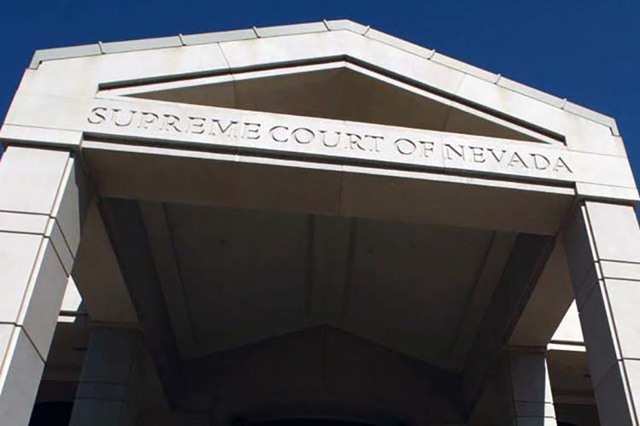Nevada Supreme Court hears case on real estate crisis foreclosure sales
CARSON CITY — A case that could affect the validity of thousands of Las Vegas foreclosure sales stemming from the real estate crisis that began nearly a decade ago was heard Thursday by the Nevada Supreme Court.
The court is now expected to rule on the question of the constitutionality of the nonjudicial foreclosure process used by investors and speculators to acquire homes at a fraction of their value by paying off liens held by homeowners associations.
The Nevada Supreme Court had previously ruled that paying off the super-priority lien held by an HOA extinguishes all other pre-existing liens, including the original mortgage.
The case heard by the court Thursday involved a home acquired by Saticoy Bay LLC Series 350 Durango 104 for $6,900 in back association dues and related costs in 2013. The foreclosure sale by the HOA Angel Point Condominiums came when the original owners fell behind on their association dues.
Wells Fargo Home Mortgage had loaned the original owners just under $82,000 in 1997 for the purchase of the condominium.
The sale extinguished the mortgage held by Wells Fargo.
Saticoy sought a ruling in Clark County District Court that it was the owner of the property. But District Court Judge Ronald Israel ruled for Wells Fargo finding the Nevada foreclosure statute violated the state and U.S. Constitutions.
Saticoy appealed to the Nevada Supreme Court.
In the oral arguments, Saticoy attorney Jacqueline Gilbert argued that the sale was proper and asked the court to uphold the legality of the transaction and the constitutionality of the state foreclosure law. She told the Supreme Court that Wells Fargo failed to protect its interest.
Wells Fargo argued that the sale violated the due process clauses of both the Nevada and U.S. Constitutions by extinguishing its property rights without providing notice.
Attorney Andrew Jacobs, representing Wells Fargo, said the foreclosure law gave a private entity, the HOA, authority from the state to take its property without notice.
“The takings clause does not permit that,” he said.
Jacobs said the Nevada Legislature in 2015 put in the notice requirement going forward because of concerns about the former foreclosure law.
The Nevada Supreme Court’s decision in the case could have a direct bearing on a similar case that recently saw a controversial 2-1 decision by the 9th U.S. Circuit Court of Appeals. In the decision released in August, the appeals court panel said the “opt in” notice requirement in Nevada law violated the constitutional rights of the mortgage lenders.
The complex dispute over the foreclosure sales dates to the foreclosure crisis that began in 2008. The law was changed by the Nevada Legislature in 2015 going forward to resolve the notice issue and other concerns.
Las Vegas Attorney Michael Bohn, representing Bourne, has asked the 9th Circuit for a rehearing in the case titled Bourne Valley Court Trust versus Wells Fargo Bank.
The stakes are high for both sides in both cases.
If the appeals court ruling is upheld, the acquisition of the hundreds of homes by investors who paid just a few thousand dollars to satisfy HOA-held super-priority liens could be in jeopardy. The sales could be nullified because of the 9th circuit ruling, restoring the status of the foreclosed homes with the mortgage lenders again holding the priority liens on the properties.
Because of the legal disputes and questions over ownership, none of the properties can be sold because they have clouded titles. It will take additional rulings from Nevada and federal courts to finally resolve the issue for all of the involved parties.
In a “friend of the court” brief filed in support of an appeals court rehearing by the Nevada Legislature, attorneys for state lawmakers said in part: “Because the invalidated provisions have been effective for 25 years, the panel’s decision could adversely affect hundreds of HOAs and call into question thousands of foreclosures, which could cloud property titles and undermine the stability and vitality of Nevada’s real estate markets.”
Contact Sean Whaley at swhaley@reviewjournal.com or 775-461-3820. Follow @seanw801 on Twitter.
RELATED
Nevada Supreme court hears case on investors' acquisition of homes
Appeals court dashes hopes for investors who bought foreclosed homes in Nevada
State Supreme Court rules on superpriority liens

















